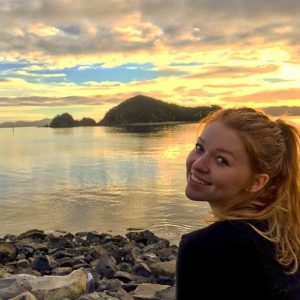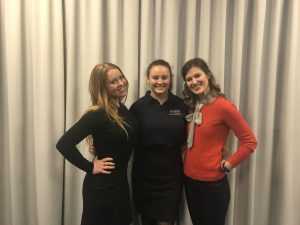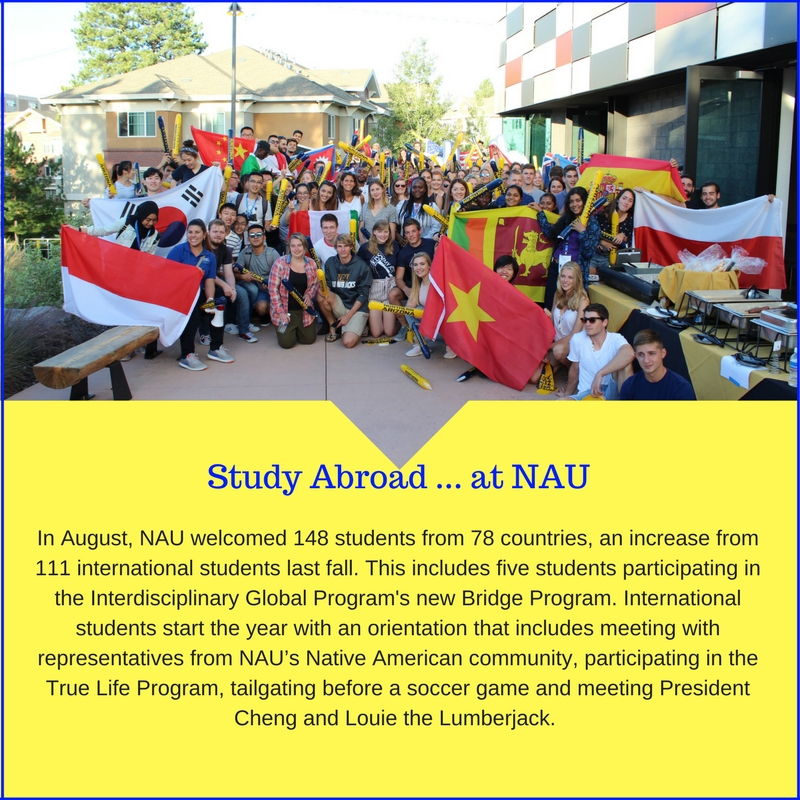By Heidi Toth
NAU Communications
In May, Miranda Henry finished her junior year at Northern Arizona University. She was an international relations major but hadn’t narrowed down yet just what that career would look like.
Three months and about 8,000 miles later, she has an answer. After an emergency management internship in New Zealand—an internship that allowed her to work alongside other interns as well as government and business officials—she’s already looking for ways to relocate and start planning for island emergencies.
“I feel like this is so cheesy, because it’s like a coming of age thing, but I realized what I want to do. I want to do this,” said Henry, who is from Orange County, California. “International relations is fairly broad, and now I know what I want to specialize in.”
Getting a global education
Every year a few hundred NAU students head out into the world for a summer or semester study abroad or a weeklong intensive international experience geared to their majors. This fall, 150 students will study abroad at one of NAU’s partner universities, a slight increase from a year ago, said Daniel Palm, executive director of the Center for International Education (CIE). The number of international students who come to NAU soared this year, to 148 in fall 2017 from 111 in fall 2016.
“The transformational opportunities that study abroad provides are crucial in preparing NAU graduates to navigate an increasingly interconnected and global environment,” he said. “Being globally competent is a prerequisite for success in the 21st century.”
For Henry, the CIE was her gateway to this experience. CIE staff told her about Massey University’s Disaster Risk and Emergency Management National Expedition and Internship, though it was not a partner university. Additionally, Henry’s best friend is from New Zealand, so she was already interested in checking out the country. She applied, and somewhat to her surprise, she was accepted.
In June she left for Wellington, the capital of New Zealand, spending a week touring the country with her friend before the internship began. She and 10 other interns spent the first two weeks again touring the country, this time looking at different landscapes and identifying hazards, discussing what could potentially go wrong in each environment and ways to adequately respond to such events.
Back in Wellington, the 11 were assigned to different departments. Henry worked with the Wellington City Council’s legal and risk department business continuity team and emergency management team along with two other interns. The rest were with the Ministry of Health, fire and police departments or nongovernmental organizations that respond to emergencies.
The experience did exactly what internships should do: help Henry gain experience and make decisions about her future career. Janea Byrne, NAU’s internship coordinator, said the applied experience, skills and professional connections students gain during internships will help them as they’re looking for jobs after graduation. About half of NAU undergraduates report participating in an internship during their time here.
“For college students, there is no better way to test drive careers of interest than to experience them first-hand through an internship,” Byrne said.

A day in the life
Henry had basically one job as an intern for the Wellington City Council: write an emergency plan from ground zero that, with tweaks as needed, would become the city’s emergency plan.
She was busy, to say the least.
“They apparently have a lot of faith in their interns,” she said. “I didn’t think it would actually be used, but they are planning on using it and will reform it if needed, which is really cool.”
Henry started with meetings and doing research, visiting with people in emergency management and business continuity, researching New Zealand’s laws and what other countries do. Her plan focused on cordon management: how to keep people out of dangerous areas during an emergency.
“It seems really simple on paper—like, literally you just put a fence up,” she said. “But if it’s in a city and all these buildings collapse, you could be infringing on people’s civil liberties if you do that. People can’t go into their houses or businesses; they can’t earn their livelihood. There’s a lot of different social, environmental and economic impacts you have to take into account when designing a plan like this.
After doing research, she wrote, meeting frequently with her supervisor for critiques and ideas and going through multiple drafts of the plan, paying attention to all the different issues that could arise. She kept in mind the different types of emergencies New Zealand could face, the variances between the numbers of affected people and other variables that could arise in an emergency that required cordon management.
Once the plan was written and approved, she had to sell it to people. The final weeks of her internship were once again spent in meetings, visiting with emergency management and government personnel who would be responsible for carrying out the plan in an emergency.
Advice

Studying abroad is a valuable experience for students of any major. For students who want careers in international relations, it’s almost a necessity.
New Zealand was Henry’s second study abroad; she also spent a semester in Prague through an official NAU program. Between the two experiences, she had thoughts for other students considering making the trip.
The biggest was simply not to be scared, or least don’t not go because of fear. Henry knew nothing about emergency management when she accepted the internship. She also was the youngest of the 11 interns. Her peers there were military veterans, former Foreign Service officers, even a former Venezuelan diplomat.
“I was terrified, but NAU provides a solid educational foundation to at least act like you know what you’re doing,” she said, adding the “knowing what you’re doing” phase will come.
She also encouraged students, particularly others in international relations or a similarly broad degree, to find a niche.
Oh, and remember you’re an intern when talking with other people, a lesson Henry learned during a meeting with a government official.
“I only had half an hour to explain my emergency plan, and he kept interrupting me, so I said, ‘Stop talking or leave, so I’m not wasting my time,’” she said. “It turned out he was one of the head people in the New Zealand government, which I didn’t realize. He ended up liking me, though, but things kind of got to my head a little bit.”




